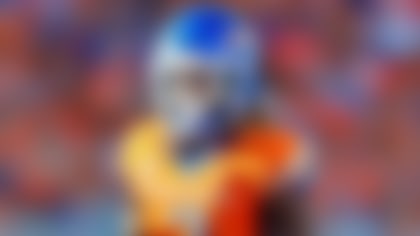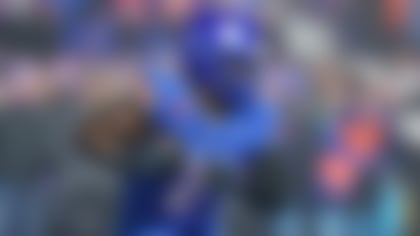As the end of the 2015 regular season nears, several teams will have big decisions to make about the most important position on the field -- quarterback. Bucky Brooks and Daniel Jeremiah have reviewed the play of eight passers and report on each of their strengths, weaknesses and whether their organizations should keep them as QB1s next season.
Kirk Cousins, Washington Redskins
Status: 2016 free agent
(Record: 6-7; Comp. percentage: 69.2%; Y/A: 7.3; TDs: 18; INTs: 11; Passer rating: 93.2)
STRENGTHS
Bucky Brooks: Cousins is a workmanlike passer with adequate arm talent and pocket-passing skills. He is a nice fit in Jay Gruden's offense as a pinpoint connect-the-dots playmaker. Cousins shines in a quick-rhythm offense designed to get the ball into the hands of electric playmakers with running skills. Although he has been prone to turnovers when he attempts to do too much, he has learned to scale back the risky throws in key moments.
Daniel Jeremiah: Kirk has all of the tools. He has good size, quick feet and plenty of arm strength. He is extremely accurate underneath and intermediate, and he has really improved his decision making this season.
WEAKNESSES
BB: Cousins lacks elite arm strength and talent. He capably makes throws within the short and intermediate range, but he can struggle with deep throws outside the numbers. Thus, he is limited to playing within a horizontal offense that features only a handful of vertical shots in the game plan. With a spectacular talent like DeSean Jackson on the perimeter capable of delivering explosive plays, Cousins' limitations take away a dimension of the Redskins' attack.
DJ: Although he's cut down on the turnovers lately, he's still prone to one or two questionable throws per game. Also, his accuracy when throwing the deep ball has been inconsistent.
SHOULD THEY KEEP HIM?
BB: Yes. Cousins has been an upgrade over RGIII as the Redskins' starting quarterback. He has been an effective starter for the team, leading Washington on an unlikely playoff run. Given the need for stability at the position, Cousins' solid play should warrant an extended look as the team's starter.
DJ: Absolutely. Kirk is an efficient, accurate passer with outstanding intangibles. The Redskins should look to lock him up with a long-term contract at a reasonable price during the upcoming offseason.
Blaine Gabbert, San Francisco 49ers
Status: 2017 free agent
(Record: 2-3; Comp. percentage: 63.2%; Y/A: 7.5; TDs: 6; INTs: 3; Passer rating: 90.7)
STRENGTHS
BB: Gabbert is an athletic passer with A-plus arm talent. He capably fires fastballs to every area of the field with outstanding zip and velocity. Gabbert has grown immensely as a pocket passer, displaying better patience, poise and courage with rushers in close proximity. This is a huge sign of growth for a passer who struggled in that area as a young player in Jacksonville.
DJ: Gabbert has ideal physical tools: He's big, athletic and has a strong arm. He is smooth in his drops and he can throw accurately on the move.
WEAKNESSES
BB: Gabbert has become a much better decision maker, but remains a work in progress as a playmaker from the pocket. He is still learning how to push the envelope as a passer while avoiding the big mistake.
DJ: Poise, consistency and accuracy have all been concerns during Gabbert's career. He's shown improvement in all three areas this season, but it's still too early to fully buy in.
SHOULD THEY KEEP HIM?
BB: Yes. The 49ers might've discovered their franchise quarterback when they turned to Gabbert as the starter in the middle of the season. The fifth-year pro has shown that he can win games within the 49ers' offense, which is critical to a franchise searching for continuity on the offensive side of the ball.
DJ: Yes. They control his rights at a very low price for the 2016 season. They can afford to wait another year to see if he's worthy of a long-term deal.
Ryan Fitzpatrick, New York Jets
Status: 2016 free agent
(Record: 8-5; Comp. percentage: 60%; Y/A: 7.0; TDs: 25; INTs: 11; Passer rating: 89.8)
STRENGTHS
BB: Fitzpatrick is an outstanding quick-rhythm passer with a compact delivery and quick release. He is at his best operating out of a spread system that features an assortment of short and intermediate routes, which plays to his strengths as a catch-and-throw passer. Fitzpatrick has grown immensely as a game manager this season, exhibiting better judgment and situational awareness (low turnover rate).
DJ: Fitzpatrick is a perfect match for Gailey's system. He processes information very quickly and does a nice job distributing the ball to the various playmakers on the Jets' offense. He has enough mobility to extend passing plays, and he's also an effective runner when needed.
WEAKNESSES
BB: Fitzpatrick has limitations as a playmaker due to his average arm talent. He is unable to fully probe every area of the field, which limits the explosive plays in the passing game. Additionally, Fitzpatrick remains a questionable decision maker under duress.
DJ: He is very confident in his arm and will take some unwarranted risks at times. He's cut down on the turnovers the last few seasons, but he's still upside down over his career in touchdown-to-turnover ratio.
SHOULD THEY KEEP HIM?
BB: Yes. Fitzpatrick isn't a sexy name, but he has stabilized the Jets' most important position. The veteran has thrived in Chan Gailey's system and connected with the team's dynamic WR corps (Brandon Marshall and Eric Decker). Given the challenge of finding a quality starter in today's NFL, the Jets should make a strong effort to re-sign the veteran in the offseason.
DJ: Yes. I'd look to do a short-term extension (two to three years) and pay him middle-tier starting quarterback money.
Brian Hoyer, Houston Texans
Status: 2017 free agent
(Record: 4-4 as starter; Comp. percentage: 60.5%; Y/A: 7.2; TDs: 18; INTs: 6; Passer rating: 93.0)
STRENGTHS
BB: Hoyer is an effective game manager with just enough arm talent to win with a stellar supporting cast. He typically avoids big mistakes and finds a way to generate enough plays to lead his team to wins.
DJ: Hoyer is very smart and he's well-liked in the locker room. He is a touch passer with good pocket awareness and accurate underneath.
WEAKNESSES
BB: Hoyer has serious limitations as a starter despite bringing plenty of experience to the position. He lacks the arm strength to push the ball to all areas of the field, which allows the defense to squeeze and condense the passing game. Hoyer also lacks the athleticism and mobility to escape from pressure.
DJ: He lacks ideal size and arm talent. He has completely maxed out his potential, and he's better served as a quality backup
SHOULD THEY KEEP HIM?
BB: Undecided. Hoyer is a nice "bridge" starter for a franchise, but he offers little beyond that. He lacks the talent to lead a team on a deep postseason run, which limits his potential as a long-term starter.
DJ: He has a very good understanding of Bill O'Brien's system and that should make him an asset to the Texans' future starter (not currently on the roster). However, he didn't really embrace the mentor role in Cleveland with Johnny Manziel. It might be better for all involved if Hoyer moves on.
Brock Osweiler, Denver Broncos
Status: 2016 free agent
(Record: 3-1 as starter; Comp. percentage: 63.5%; Y/A: 6.7; TDs: 5; INTs: 3; Passer rating: 85.4)
STRENGTHS
BB: Osweiler is a talented pocket passer with sneaky athleticism and movement skills. He's accurate on short and intermediate throws from the pocket and on the move. Although Osweiler doesn't posses a big arm, he is an adequate deep-ball passer with a nice touch and velocity on vertical throws.
DJ: Brock has excellent size, mobility and a quick release. He has enough arm strength to make all of the throws, and he is comfortable on the move.
WEAKNESSES
BB: Osweiler has a tendency to hold onto the ball when the pocket collapses around him, leading to unnecessary sacks. Despite his desire to avoid turnovers and miscues, Osweiler's hesitancy prevents the Broncos from staying ahead of the chains.
DJ: Lack of experience and reps are the main concerns. He only started for one full season at ASU, and he sat on the bench for his first 3.5 NFL seasons (behind Peyton Manning). He doesn't have a "wow" arm, but it's good enough.
SHOULD THEY KEEP HIM?
BB: Yes. Osweiler has shown more than enough to merit serious consideration as the Broncos' future franchise quarterback. He is not only a better fit in Gary Kubiak's offense than Peyton Manning, but he is a better passer than the five-time MVP is at this late stage in his career.
DJ: Yes. I know he's had some rough spots over the last couple weeks, but there's a lot to like about his game. I'd look to sign him to a short-term, incentive-laden contract and give him a chance to prove himself next season. At worst, he'd be a nice bridge QB before handing the reigns to a high pick in the upcoming draft.
Johnny Manziel, Cleveland Browns
Status: Club option in 2018 and free agent in 2019
(Record: 2-2 as starter; Comp. percentage: 61%; Y/A: 7.6; TDs: 6; INTs: 3; Passer rating: 89.2)
STRENGTHS
BB: Manziel is a spectacular improvisational playmaker with a knack for creating big plays on the perimeter. He is at his best when allowed to create on the edges as a run-pass threat. Although Manziel has made a few mistakes on scramble tosses, he's shown good awareness and playmaking on the move. Manziel has also displayed improved poise, awareness and discipline from the pocket. Morevover, he has shown better footwork and mechanics on traditional drop-back passes to complement his solid skills from the shotgun.
DJ: Johnny has outstanding playmaking ability with his legs, and he has a live arm. He's shown improvement with his ability to work through progressions and play inside the pocket. He can deliver the ball accurately both on and off platform.
WEAKNESSES
BB: Manziel's biggest issues stem from his lack of discipline off the field. His "party boy" lifestyle has led to concerns about his professionalism and preparation. On the field, Manziel remains a work in progress as a pocket passer. He doesn't consistently work through his progressions and looks uncomfortable staying in the pocket with rushers in close proximity. Alhough he has shown improved poise and awareness, Manziel is still at his best when working off script.
DJ: On the field, Johnny still needs to learn when to give up on a play and protect the football. Off the field, immaturity is still the main issue. Is he 100 percent committed to being a great quarterback? Or, is he content right now? That's what it boils down to.
SHOULD THEY KEEP HIM?
BB: Yes. If Manziel continues to show progress over the Browns' final three games, he should remain a major part of the team's plans going forward. Although he hasn't played enough games to provide team officials with sufficient time to make a sound decision on his potential, Manziel's flashes are certainly enough to make him an intriguing option for the future.
DJ: This is to be determined. A lot depends on how he finishes this season. If he plays as well as he did in his last two outings (vs. Pittsburghand San Francisco) I'd give him one more year. However, if he struggles down the stretch, it would be best to move on and wipe the slate clean for the new regime.
Tyrod Taylor, Buffalo Bills
Status: Signed for 2016 and free agent in 2017
(Record: 6-5 as starter; Comp. percentage: 63.5%; Y/A: 7.9; TDs: 18; INTs: 5; Passer rating: 100.9)
STRENGTHS
BB: Taylor is an explosive, dual-threat playmaker with impressive arm talent and pocket-passing ability. He terrorizes opponents with his improvisational skills but also displays the discipline at times to pick apart defenses.
DJ: Taylor is a dynamic athlete and he excels at extending plays and delivering the ball accurately down the field. He is a good decision maker, and he's very well-liked by his teammates.
WEAKNESSES
DJ: Lack of ideal size and durability are the main concerns. He'll need to protect himself better in order to survive 16 games a year on a consistent basis.
SHOULD THEY KEEP HIM:
BB: Yes. Taylor has been a terrific addition to the roster. He has given the Bills a charismatic leader and dynamic playmaker at quarterback. Most importantly, Taylor has flourished in Greg Roman's system, which is why the Bills remain in contention for a playoff berth despite a disappointing defense.
DJ: This one is easy. They should look to lock him up to a long-term deal. He has a unique skill set and his intangibles limit the risk of this being a fluke season. The cost will only go up if they decide to wait another year to get a deal done.
Sam Bradford, Philadelphia Eagles
Status: 2016 free agent
(Record: 6-5 as starter; Comp. percentage: 63.2%; Y/A: 6.7; TDs: 14; INTs: 11; Passer rating: 82.9)
STRENGTHS
BB: Bradford is a very accurate passer with enough arm talent to stretch the field vertically or horizontally from the pocket. He throws a catchable ball that routinely allows receivers to pick up chunk yards after the catch. Although he is not an elite athlete, Bradford flashes enough mobility to execute the movement-based passing game on the perimeter.
DJ: Bradford has a compact release and enough arm strength to make every throw. He is very quick to work through progressions, and he is willing to hang in the pocket and take punishment.
WEAKNESSES
BB: Durability is Bradford's biggest issue based on his long injury history as a collegian and pro. He has missed significant time throughout his career, including 2014 with a knee injury and part of the 2015 season with various ailments that prevented him from suiting up for the Eagles. Given the importance that team's place on the starting quarterback, Bradford's lack of availability makes him a huge risk as a franchise player.
DJ: Durability has always been the issue with Bradford. He has missed 33 games during his six-year career, including two this season.
SHOULD THEY KEEP HIM?
BB: Yes. Bradford has started to come on strong for the Eagles as a playmaker down the stretch. He has distributed the ball well to the team's perimeter playmakers, and his accuracy has ignited the Eagles' passing game in recent weeks. Although his lack of running skills limits the Eagles' zone-read based running game, Bradford's leadership and passing skills have kept Philly in the playoff hunt despite their overall inconsistency.
DJ: Yes. I wouldn't commit to a long-term extension, but I'd look to get him locked up for two to three years at a fair number. If he demanded a longer contract, I'd pursue a heavily incentive laden deal to protect the club in case his durability issues reappear.











